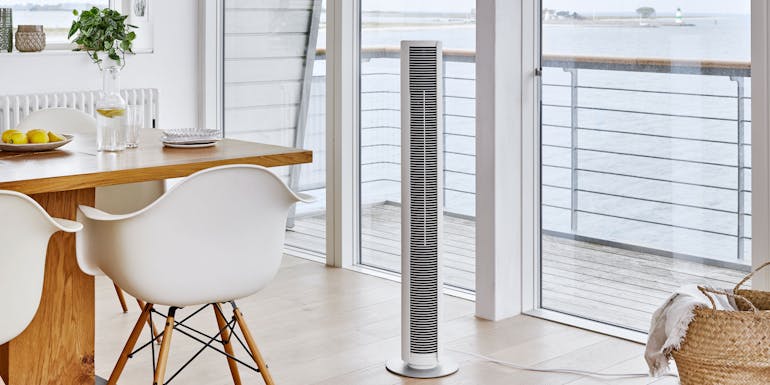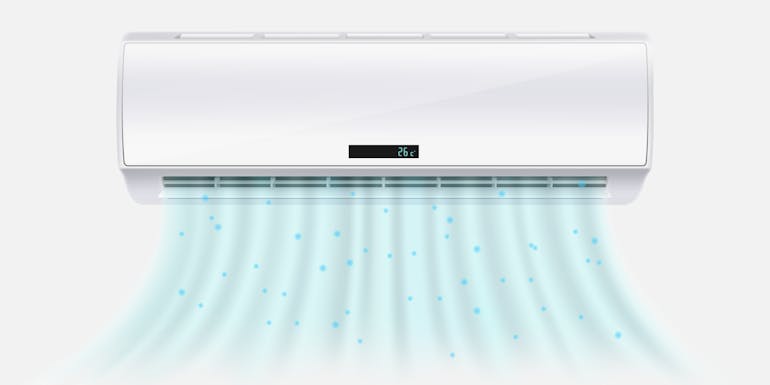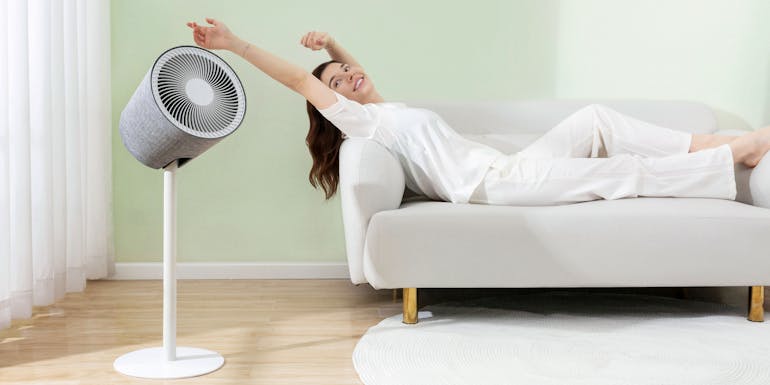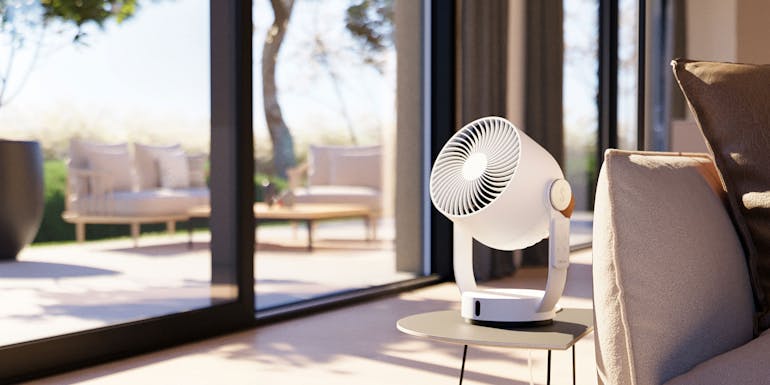
Nadine Walder, 26 June 2023
Regulating air temperature
Fan or air conditioner: which is really the best on hot days?
On hot summer days, what we all long for is to cool down. Every summer, we ask ourselves the same question: what really is the best way to cool down and keep cool indoors on hot days? One question that is frequently asked is whether a fan or an air conditioner is the best option. In this article, I reveal why a fan is the ideal companion on hot summer days and what benefits it has over an air conditioner.
Read on to find out:
- Air conditioner or fan: what is the difference between these devices?
- Fan or air conditioner: power consumption and cost efficiency
- Natural air circulation vs. artificial cooling
- Flexibility and mobility of fans and air conditioners
- Fans and air conditioners: how environmentally-friendly are they?
Air conditioner or fan: what is the difference between these devices?
A fan is a device which circulates the indoor air and creates wind in order to produce a cooling effect. A fan normally consists of a motor that drives a rotor which in turn has blades to circulate the air. Fans suck in air and then blow it out again in a certain direction. There are various types of fan, including pedestal fans, floor fans or 3D fans.
In contrast to a fan, an air conditioner is a device that actively cools the temperature. An air conditioner provides artificial cooling by means of a technical process which uses the warm indoor air. This is sucked in and cooled down by a coolant that is prepared in the device before being emitted back into the room as cooler air. The cooled air is blown into the room until the desired temperature level has been reached.
Fan or air conditioner: power consumption and cost efficiency
A major benefit of fans compared to air conditioners is their cost efficiency. Not only are air conditioners expensive to buy, they also cost a lot to run and maintain. They use considerably more energy which will have an effect on your monthly electricity bill. In contrast, fans are much cheaper and more energy-efficient, requiring only a fraction of the energy to provide pleasant air circulation.
3D fan Simon, for example, is an extremely efficient fan with a wind distance of up to 10 metres. His maximum consumption is 24 watts on his highest setting which enables him to move around a wind volume of 45 m3 of air per hour. An air conditioner uses around 20 to 50 times more electricity so if you want to save money, a fan is a much better option.
Natural air circulation vs. artificial cooling
A further benefit of fans compared to air conditioners is that they are designed for natural air circulation. Fans do not actively cool the indoor air but the flow of air provides pure refreshment. This raises the question of whether a fan has a cooling effect and if so, how. A fan does not actually cool the indoor air but it does provide refreshment. The flow of air blows away the insulating layer from your skin, enabling body heat to be dissipated more efficiently and perspiration to evaporate quicker from your skin, creating a cooling effect.
In contrast, air conditioners cool the air artificially and extract moisture from the indoor air. This can create an unpleasantly dry indoor climate which can have a negative impact on your skin and airways. The sometimes significant differences in temperature between the indoor and outdoor air also increase the risk of you catching a cold or summer flu. You don’t have this risk with a fan as long as it is not permanently directed at a person.
Special tip: If you set up your fan by the window or door to the balcony in the evening, it can blow the cool night air around in the room.
Flexibility and mobility of fans and air conditioners
Fans provide a high level of flexibility and mobility. They come in various sizes and types, including pedestal fans, table fans and tower fans. You can set them up wherever you want them to go in a room and adjust their wind direction. Air conditioners on the other hand are normally permanently installed and can only cool a limited area. With a fan, you can move from room to room and take the fresh breeze with you, where you need it most.
Air conditioners are also extremely costly to install. Their outlet pipe must be routed outside and in order to stop even more heat coming in, it must be properly sealed – otherwise the air conditioner becomes even more of an energy-guzzler.
Fans and airconditioners: how environmentally-friendly are they?
Last but not least, you should also take the ecological impact into consideration when choosing between a fan or air conditioner. Air conditioners are known for using a lot of electricity and having an impact on the environment. They usually go on for many years but when it comes to disposing of them, they pose a problem. The coolant is classed as hazardous waste and cannot be recycled. Fans on the other hand use a lot less energy.
Fans are therefore not only more cost-effective and energy-efficient compared to air conditioners but also promote natural air circulation and provide increased flexibility and mobility. Are you not perfectly prepared for hot summer days yet and still need a fan? Stadler Form has a wide range of fans for you to choose from – so you will definitely be able to find the one that is right for you.
If you have questions related to indoor room climate, please get in touch with us. Or subscribe to our newsletter to regularly get informed about current topics regarding indoor climate, experience reports or Stadler Form insights.



